By Eric Vandenbroeck and co-workers
The General Situation in Syria Today
Following our report yesterday thousands of Syrians celebrated in
the streets of Umayyad Square in the center of Damascus.
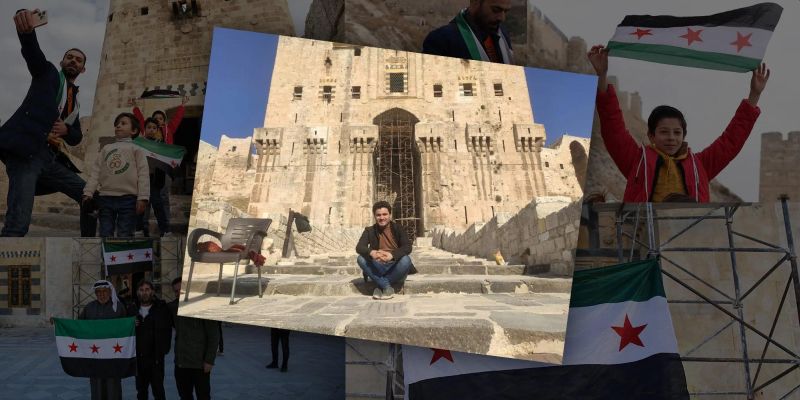
Thousands of Syrians
celebrated in the streets of Umayyad Square in the center of Damascus, Syria,
on Monday. Shock, Glee, and Unease as Syrians Celebrate the Unthinkable A day
after the regime of President Bashar al-Assad fell, civilians poured into the
streets of Damascus, weeping in disbelief. Many sought word of relatives held
in a notorious prison on the outskirts of the city. Thousands of Syrians
celebrated in the streets of Umayyad Square in the center of Damascus, Syria,
on Monday.
Syrian security
checkpoints sat empty on Monday across Damascus. Abandoned tanks were scattered
across the roads, along with stray pieces of military uniforms stripped off by
soldiers when opposition forces stormed into the city a day earlier. Rebels
with rifles slung over their shoulders drove around, many seemingly shocked at
just how quickly they had ousted Syria’s long-entrenched president, Bashar
al-Assad. Damascus residents, too, were walking around the city’s streets in a
state of disbelief. Some rushed to a notorious prison on the outskirts of
Damascus, the capital, desperate to find loved ones who had disappeared under
Mr. al-Assad’s brutal reign. Others clambered on top of cars and screamed
curses at the Assad family, words that days ago could have meant a death
sentence. By day’s end, with Mr. al-Assad and his family having fled on a
plane to his ally Russia, thousands of Syrians had converged at Umayyad Square
in the city center to revel in the fall of the regime and their newfound, if
uncertain, sense of freedom.
Underneath a young
man sits with his arms spread wide on the gun of a military tank, as others
stand behind him.
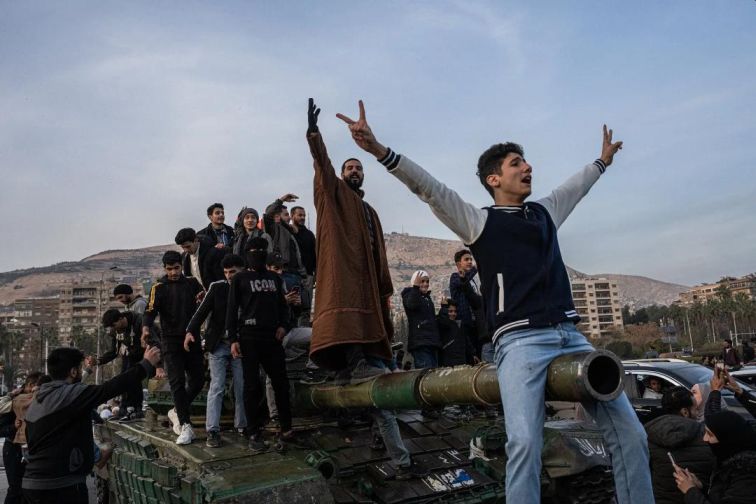
Viewpoint From the US
Of all the foreign
upheavals that the Biden administration has had to confront and manage in
recent years, Syria was not on anyone’s list of likely crises.
A U.S.-backed Syrian
peace process, begun after civil war broke out in 2011, was moribund. Lines
dividing the country into spheres of influence among world and regional powers
hadn’t changed significantly for years. Arab governments that once worked to dislodge
Iranian-backed President Bashar al-Assad had started to enfold him in their
embrace.
The sudden offensive
launched by the Islamist Hayat Tahrir al-Sham (HTS) rebel group, leading to the
collapse of Assad’s government and military forces in less than two weeks, has
left governments around the world scrambling to figure out what to do about it,
none more so than the Biden administration.
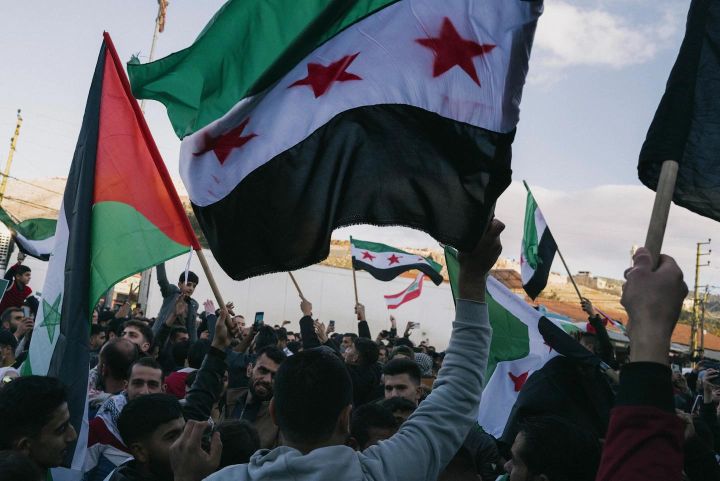
Syrian security
checkpoints sat empty on Monday across Damascus. Abandoned tanks were scattered
across the roads, along with stray pieces of military uniforms stripped off by
soldiers when opposition forces stormed into the city a day earlier.
Rebels with rifles
slung over their shoulders drove around, many seemingly shocked at just how
quickly they had ousted Syria’s long-entrenched president, Bashar
al-Assad. Damascus residents, too, were walking around the city’s streets in a
state of disbelief.
Some rushed to a
notorious prison on the outskirts of Damascus, the capital, desperate to find
loved ones who had disappeared under Mr. al-Assad’s brutal reign. Others
clambered on top of cars and screamed curses at the Assad family, words that
days ago could have meant a death sentence.
By day’s end, with
Mr. al-Assad and his family having fled on a plane to his ally Russia,
thousands of Syrians had converged at Umayyad Square in the city center to
revel in the fall of the regime and their newfound, if uncertain, sense of
freedom.
“We’re shocked; all
of us are just shocked,” one woman, Shahnaz Sezad, 50, said. “It’s as if we’re
all coming back to life after a nightmare.”
She watched, tears
welling up, as a scene unimaginable just days ago played out in front of her.
One rebel shouted into a microphone: “The Syrian people want to execute Bashar!
The Syrian people want to execute Bashar!” A deafening “paw-paw-paw” of gunfire
sounded as others shot into the air.
Rebel fighters pose
as they hold a Syrian opposition flag at the Umayyad Mosque after rebels seized
the capital and ousted Syria's Bashar al-Assad, in Damascus
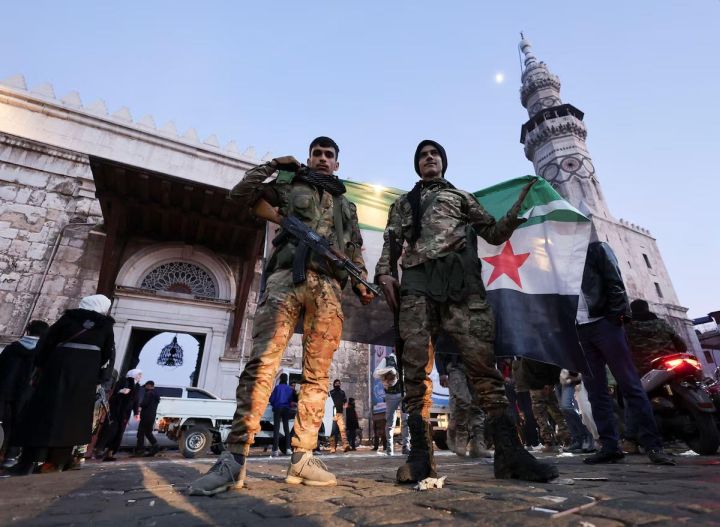
Israel said Monday
that it had carried out strikes across Syria as rebel forces claimed control in
Damascus, the capital, after the ouster of President Bashar al-Assad and his
government. In an address Monday, Israeli Prime Minister Benjamin Netanyahu said
his country had “reshaped the Middle East,” asserting that the “blows” Israel
dealt to Hezbollah, Hamas, and Iran set off the events that led to Assad’s
downfall.
Israeli Foreign
Minister Gideon Saar said Monday that Israeli forces had struck Syrian weapon stores
and chemical weapons capabilities to prevent them from falling into the hands
of rebel groups. His remarks at a news conference came as Israel sought to
strengthen its hand more broadly over Syria’s ascendant rebels, including by
repositioning its forces in the border area.
The Previous Buffer Zone Now Gone
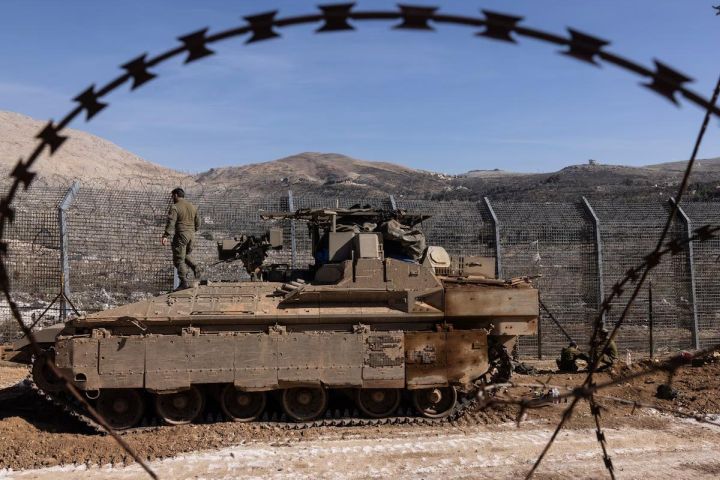
Israel has deployed
troops across
the Syrian border for the first time since the official end of the Yom Kippur
War in 1974 and conducted airstrikes inside Syria.
Israel’s Defense
Minister Israel Katz said Monday that the Israel Defense Forces are
authorized to go beyond a U.N.-monitored buffer zone separating the Israeli-occupied
Golan Heights and Syria.
Israel seeks to gain “complete
control over the buffer zone” and seize weapons and “terrorist infrastructure,”
so they can’t be used to target Israel, Katz’s office said in a statement.
Days earlier, rebel
forces had taken control of the Syrian capital of Damascus, forcing President
Bashar al-Assad into exile in Russia and overthrowing his regime.
Israeli troops were
looking for weapons caches, including chemical weapons, The IDF said that it
had deployed additional tanks, artillery, and infantry units to the border but
that no additional reserves had been called up.
Israeli Prime
Minister Benjamin Netanyahu is expected to testify in his corruption
trial on Tuesday
morning. His appearance comes against the backdrop of war in Gaza, regime
collapse in Syria, and a tenuous ceasefire in Lebanon.

·
Thousands of
family and friends of people held at Syria’s infamous Sednaya
Military Prison were combing through the facility, hoping to find loved ones,
or confirm their deaths, The Washington Post reported.
·
The United
States is focused on ensuring that the Islamic State doesn’t reemerge in Syria,
Matthew Miller, a spokesman for the State Department said,
a day after Washington launched airstrikes against 75 Islamic State targets in
the Syrian desert.
·
Hezbollah said
Israel’s actions amounted to “blatant aggression and a blatant violation” of
Syria’s sovereignty, in its first statement since the fall of the Assad regime.
For updates click hompage here